Venba is a narrative and puzzle videogame about a family of Tamils from India reckoning with their cultural roots. The narrative consists of short vignettes that show key moments in the family’s life as immigrants in Canada. The puzzles show the family’s creation of traditional Tamil meals, following instructions imparted by a deteriorating cookbook that serves as a central symbol. When taken together, I am allowed an intimate look into the inner lives and conflicts of Venba, her husband Paavalan, and their son Kavin, as they endure conflicts that separate them but also bring them closer together.
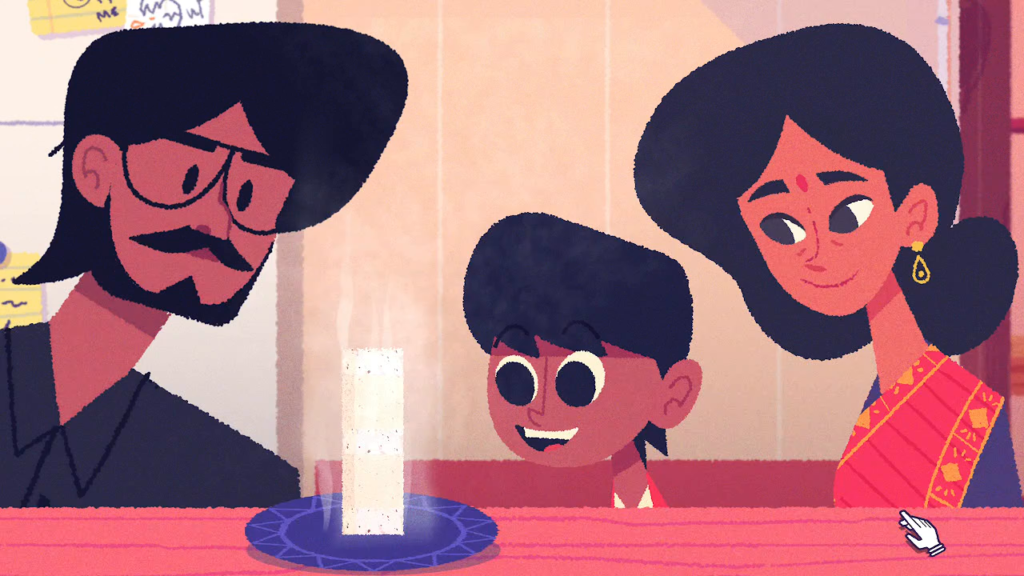
Venba is most overtly a videogame when a meal is being prepared. These moments task me with following a recipe transcribed in a family cookbook, with each recipe acting as a kind of puzzle. The book is dilapidated and its recipes handwritten, so the puzzle is as much deciphering what the recipe says as correctly following its directions. The earliest recipes are fairly simple to follow, with only a few smudged words to puzzle out. Subsequent recipes are written on water damaged or torn pages, forcing me to rely on the cook’s narrated memories to successfully complete the meal.
Completing recipes is straightforward. After showing me a page from the recipe book, I am taken to a countertop strewn with tools and ingredients. Solving the puzzle is as simple as dragging and dropping different elements of the recipe onto an electric burner in the right order. Some recipes require a little more fiddling; in the first puzzle, Venba uses a steam cooker whose stacking trays must be rotated into a specific configuration for the idlis to cook fully. Other recipes have multiple steps, shuttling me between multiple pages and multiple countertops before the meal is complete.
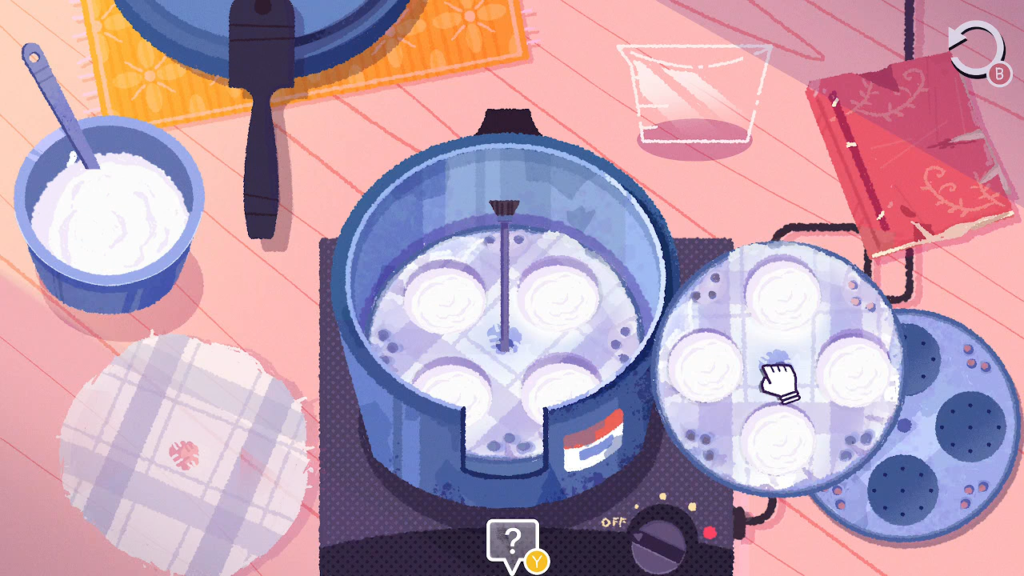
Even as the recipe book’s legibility descends into uselessness, the associated puzzle never takes more than a few minutes to solve. There’s no penalty for assembling the recipe in the wrong order. The cook simply says “let’s try that again” and I am returned to the last successfully completed step. If I’m really stuck, I can ask for a hint, though I don’t need them. There aren’t many combinations of ingredients and tools in any recipe to work through. If it comes down to it, I could solve any or all puzzles through sheer brute force. The purpose of the puzzle recipes is to milestone the story and emphasize the importance of Tamil cuisine to this family, not to leave me stuck for hours on a single inscrutable detail.
These puzzle recipes represent the bulk of my meaningful engagement with Venba as a videogame, and they are not the parts I enjoy most or feel I will remember distinctly months and years from now. Venba is much more successful as a narrative, following the family through key moments in their lives in the form of short vignettes.
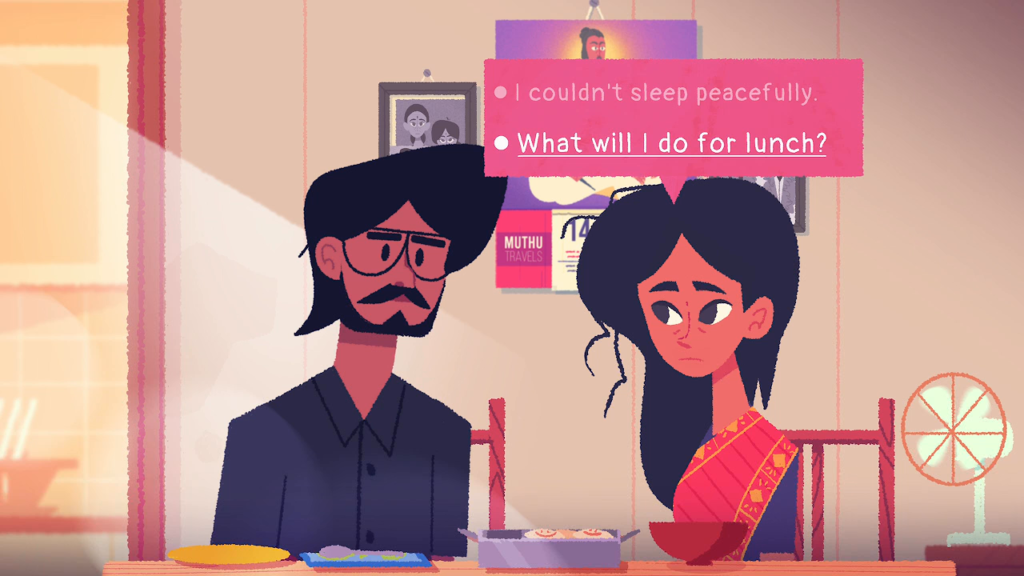
These vignettes are minimally interactive. Sometimes they prompt me to select which of two dialog choices a character may say next, but the scene’s flow soon returns to its predetermined track. My ability to influence the narrative’s outcome feels non-existent. This is not a bad thing; Venba knows exactly what story it wants to tell, how it must unfold, and where it will end. Allowing player agency over the sequence of events only gets in the way of this story.
I do wish the story would slow down. Parts of the narrative feel missing. The first vignette sees Venba lying ill and sourly raising herself from the couch to make idlis for her and Paavalan. That she is experiencing morning sickness from pregnancy is only implied. The next vignette skips ahead several years. Venba and Paavalan’s son Kavin is now five years old, and the mother struggles to keep her son quiet while the father attends a phone interview. The vignette after that skips ahead more than a decade as the family eats their last meal together before Kavin leaves for college.
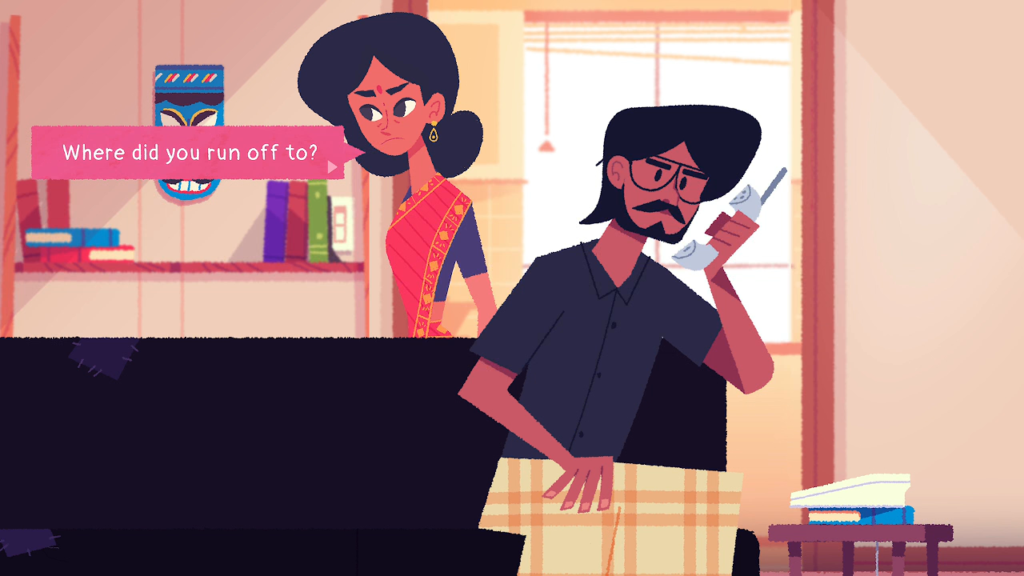
In the moment, these time skips feel too fast. Key moments of a child’s life, especially one struggling with their dual identity as a child of immigrants and a child raised in contemporary Canadian culture, are glossed over. I wish to see how Venba and Paavalan deal with caring for an infant. I especially wish to see Kavin’s life as a middle- or highschooler. These gaps feel significant. They also feel purposeful, and I am fascinated by the choice to omit them.
I also wish the story’s perspective was less narrow. I never get a clear impression of the world in which the family lives. I understand that Venba and Paavalan struggle financially, and their home is implied to be small. But I never get a sense of what their home actually is and where in Canada it exists. Is it an apartment? Is it a small house? Is it in the heart of a city, or in a smaller community? During a puzzle recipe near the middle of the story, Venba describes buying whole spices from a Tamil community that has recently become prominent in the area. I never see this community, I only hear about it.
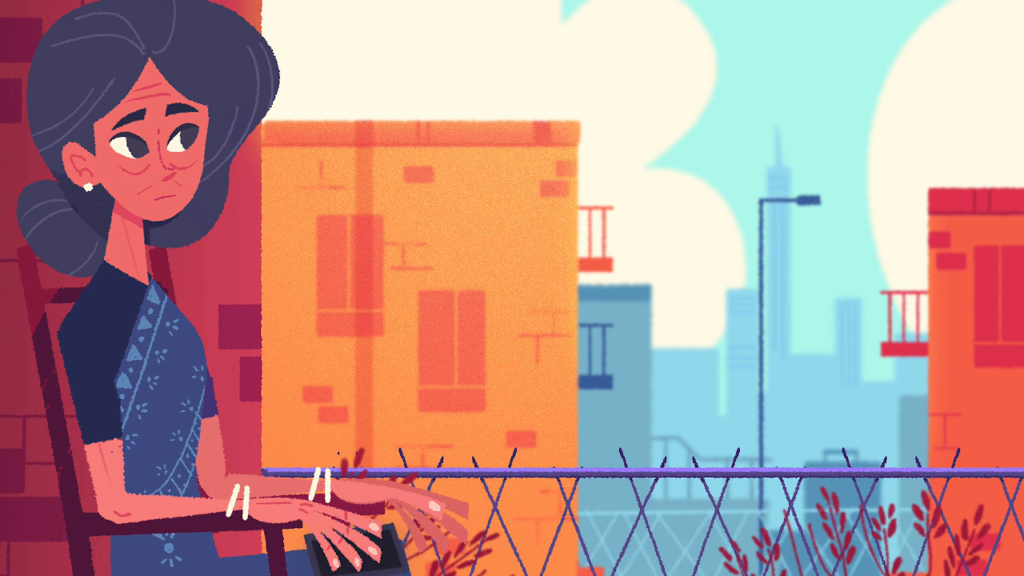
The narrow perspective on the family’s home is where I most feel Venba’s indie budget. I understand that the family lives in Canada, but I never feel it. All I see is a small, ill-defined home, an island whose occupants occasionally leave to find subsistence in an invisible, alien world.
My criticisms about the narrative are inconsequential because Venba nails its true central theme. From its surface to its core, it is a story about an immigrant’s experience. Not a generalized story of all immigrants, but a specific story about a specific family from a specific group of immigrants. As a white person born in the United States, my ability to truly understand these events is limited. While playing through the ninety minute runtime, I feel more and more like an imperceptible and transgressive intruder upon an intimate conflict.
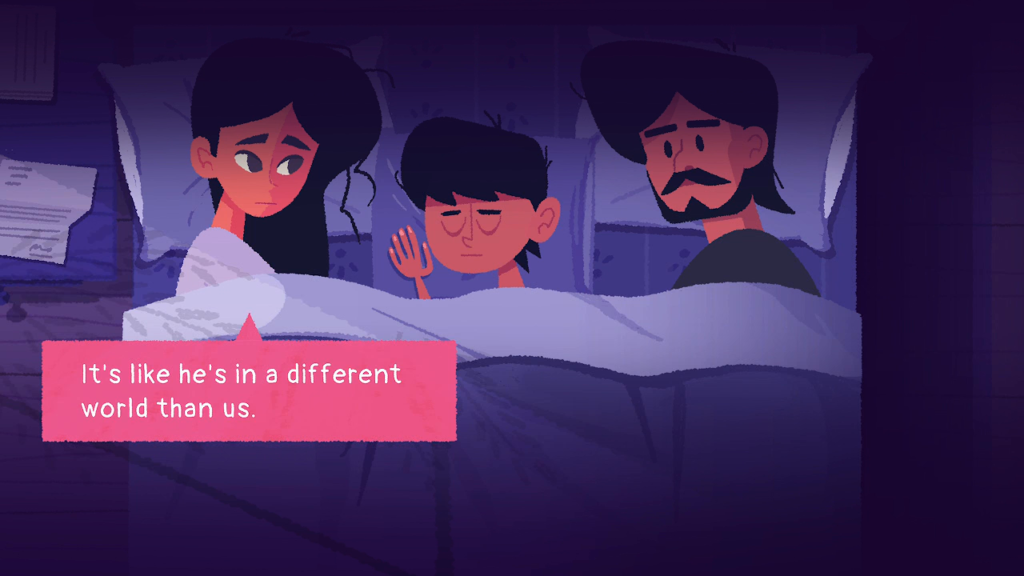
Despite my limitations, many details in the plot still jump out at me. Some are highlighted by the plot or the dialog. Others are subtler and require a careful eye to spot. Venba and Paavalan are perturbed when they learn Kavin goes by “Kevin” at school. On a similar note, Paavalan’s name is misspelled on the ID badge for his sales job. When Venba makes phone calls to strangers, she has Kavin speak for her because he speaks more fluent English—and though it is not represented in the script, likely unaccented English. Perhaps this onslaught of microaggressions is part of why Venba looks so tired in many of the vignettes in addition to her morning sickness, the family’s financial troubles, or the growing weight of age.
I can see throughout that connection to their past is important to this family. Each vignette begins by focusing on a wall calendar in the family’s home. This calendar establishes the current date in the story and shows a conveniently relevant quotation, written in Tamil script and helpfully translated into English for the benefit of an intrusive onlooker like myself. Photographs surround the calendar, showing the family members left behind in India and the new ones growing in Canada. It’s significant that each vignette focuses on this particular wall since a sense of the family’s growing disconnection with the land they came from is palpable.
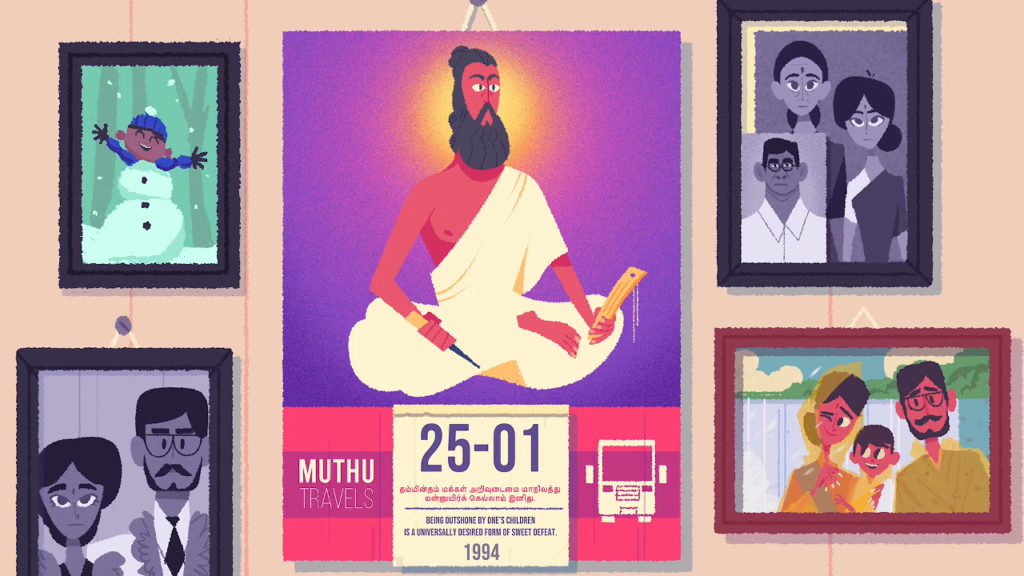
From Kavin’s first scene, Venba struggles to get him to speak in Tamil around the house. This is represented visually by the text color of the character’s dialog. White text means the dialog is spoken in Tamil, while yellow text means it is spoken in English. The effect is subtle, perhaps too much so. Since all dialog is written in English, again for the benefit of my trespassing eyes, it takes me a while to grasp that Venba and Paavalan are speaking Tamil at all. The white and yellow text is similar enough in appearance that at first I don’t even see the difference. But once I do see it, it becomes much harder to miss—and much harder to miss just how little Kavin speaks Tamil over the course of the story.
Kavin’s disintegrating connections to his parent’s culture is literally represented by the family’s recipe book. The first recipe is slightly smudged, but as the story progresses the pages of the book become so dilapidated and illegible that the cook is forced to reproduce the recipes from vague memories. The puzzle recipes become more difficult for me as a player because they are harder to read and interpret, but the narrative recipes also become more difficult for the family because of the deteriorating connection to their cultural roots.
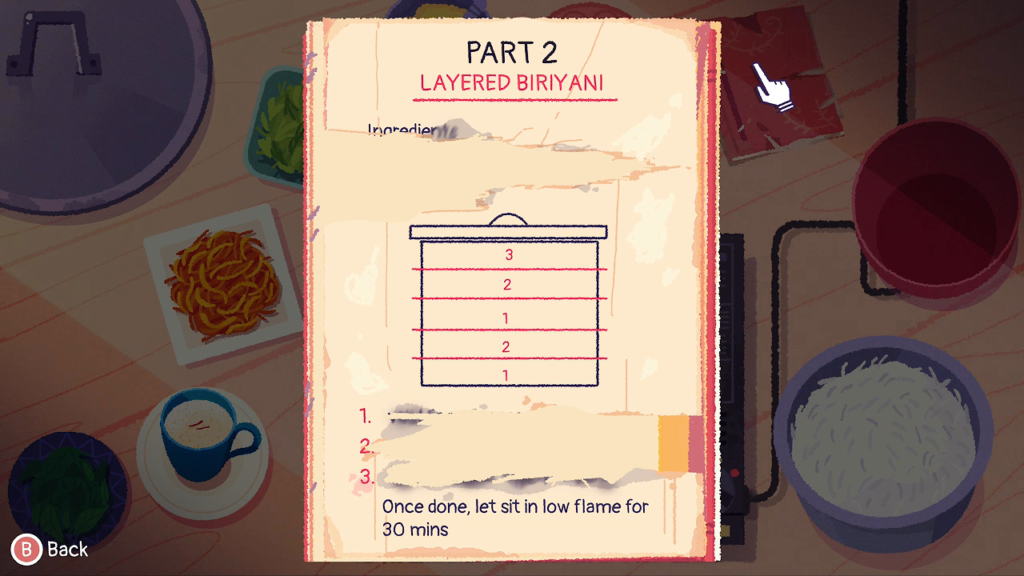
I admire Venba’s story as a whole, but it is specific, individual moments that are its most devastatingly affecting and which will stick with me the longest. Each of these outbursts, most of them centered on Kavin, make me stop in the moment and utter a shocked reproach. I may not be able to fully comprehend this immigrant’s story, but I can see how Kavin’s disconnection from his family’s culture hurts Venba and Paavalan, and it makes me feel deeply for them.
An especially emotional moment is preceded by a long string of minute recipes. Calling them puzzles isn’t fully accurate, as there is little to solve besides following on-screen button prompts. The effect is mesmerizing; the cook flies through multiple dishes with such speed that I can feel their skill and passion, whipping through a half-dozen different dishes in less time than it took me to deduce one following the recipe book. The moment rises to a crescendo of triumph and a table seemingly about to collapse under the weight of so much food. Then the mood changes. The cook sits somberly, staring off into the sky in silence. Finally a text message arrives, canceling the arranged meeting long after it has been missed. I don’t need to understand the Tamil experience to be devastated by a relative’s neglect, but the unknowing rejection of a grand spread of traditional meals adds more layers to the tragedy.
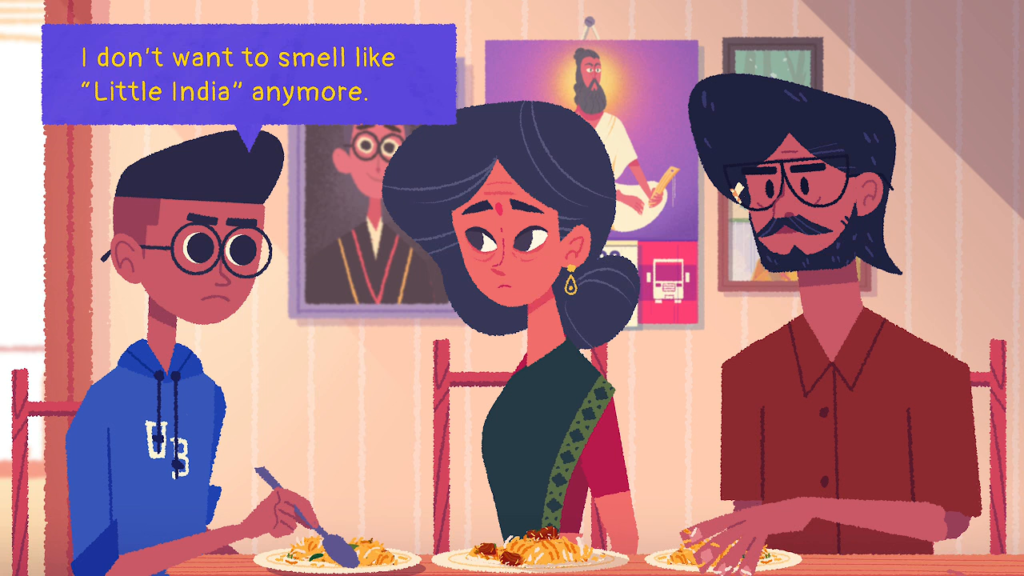
Other moments are shorter, but leave just as much of an impact. Kavin rejects a care package of homecooked meals, declaring “I don’t want to smell like ‘Little India’ anymore.” Later, he composes a long text message, describing his feelings about a vulnerable moment from his youth in great detail to a coworker. Instead of sending it, he deletes it, word by agonizing word, and instead sends a contrite and agreeable “yeah.” It’s the clearest window opened into Kavin’s feelings about his cultural roots and the only ones who know them are Kavin and myself. Once again, I feel like an intruder into a fraught and complicated relationship I can only hope to understand.
On its surface, Venba is a puzzle videogame that offers challenges to tease my brain as I try to comprehend the recipes imparted in a Tamil family’s decaying recipe book. I hope it’s not too harsh to say this feels like a conceit to smuggle an intimate and affecting story about a young man’s difficult relationship with his family’s immigrant culture onto videogame platforms. The puzzles are nice, but they’re not the reason to play. I admire this story for the risks it takes. I admire it for giving both the parents’ and the child’s perspectives a fair and sympathetic look. But most of all, I admire it for letting me in to witness the story, even if I never feel fully comfortable as an unseen spectator. I can’t feel comfortable. If I did, it would surely mean I am missing the point.